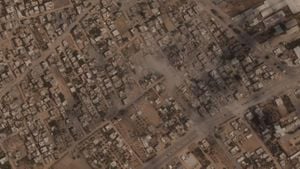The death of Yahya Sinwar, the Hamas leader, on October 16, 2024, has sent shockwaves through both the region and the international community. Sinwar, who was considered one of the most influential figures within Hamas, was reportedly killed during an Israeli Defense Forces (IDF) operation, complicuating the already tense dynamics of the Israeli-Palestinian conflict.
Sinwar was known for his hardline stance against Israel and had been active and vocal throughout his political career, primarily focusing on Hamas's military and strategic objectives. The Israeli military insisted this operation was necessary as part of broader efforts to neutralize threats against Israeli citizens. IDF spokespersons claimed operations targeting significant Hamas figures like Sinwar were pivotal for diminishing the military capabilities of the group.
His death came merely days after Hamas launched surprise attacks on Israel on October 7, 2023, which resulted in heavy casualties and escalated the hostilities significantly. The subsequent response from Israel was marked by fierce bombardments across Gaza, leaving thousands of Palestinians dead and displacing many more. This conflict has seen massive destruction of infrastructure, with estimates indicating more than 43,000 Palestinian casualties, according to official sources.
Following Sinwar's death, conflicting narratives emerged about his legacy. Proponents view him as a martyr and defender of Palestinian rights, celebrating his opposition to what they perceive as oppressive Israeli policies. Conversely, critics highlight his role in perpetuating violence against Israeli civilians and sustaining Hamas's militant strategies, which they argue hinder peace efforts.
Interestingly, the aftermath of his death was marred by misinformation. Claims surfaced online, particularly on social media, alleging the existence of links between Sinwar and humanitarian groups. A notable false claim suggested a passport found near his body belonged to his deceased bodyguard, who was supposedly employed by the United Nations Relief and Works Agency (UNRWA) as a teacher. This claim was swiftly debunked by AAP FactCheck, clarifying the passport belonged to another individual who is currently alive and living in Egypt.
UNRWA officials condemned the spread of these false narratives, emphasizing the importance of checking information before disseminations. They reinforced their position on neutrality and humanitarian assistance, stating their commitment to help those affected by the conflict, regardless of political beliefs.
Such misinformation, according to experts, not only inflates tensions but also diminishes trust among communities both locally and globally. The need for accurate reporting and the challenges of ensuring the truth is often overlooked during chaotic periods like this. The international community is now more vigilant about ensuring credible information prevails, as rumors can rapidly escalate tensions.
Against this backdrop, the situation on the ground remains dire. With Israeli authorities stating they will no longer allow Palestinians to return to their homes in northern Gaza following extensive bombardments, many families are facing despair. The World Health Organization reported hospitals overwhelmed with casualties, underlining the humanitarian crisis propagated by the conflict.
The extensive damage to key locations, such as the Jabaliya refugee camp, adds to the distress, with displaced families seeking shelter wherever they can find it. With humanitarian corridors limited, international organizations have warned of urgent needs for food, water, and medical supplies.
Despite the turmoil, there’s also resilience among Palestinians who continue to advocate for their rights and seek help from the global community. Activists are raising awareness about the humanitarian plight of civilians caught up in the violence, aiming to facilitate aid and attention to their struggles.
Moving forward, how this incident will impact the broader geopolitical climate remains to be seen. The leadership within Hamas now faces the session amid the turbulence following Sinwar’s departure, and various factions within the organization may seek to assert dominance or reshape their strategies moving forward.
What remains evident is the tragic toll this conflict has taken and continues to take on innocent lives. The recent escalation following the death of Yahya Sinwar has left many questioning the potential for peace and reconciliation. The stakes have never been higher for both Palestinians and Israelis as the need for dialogue and resolution remains urgent.



